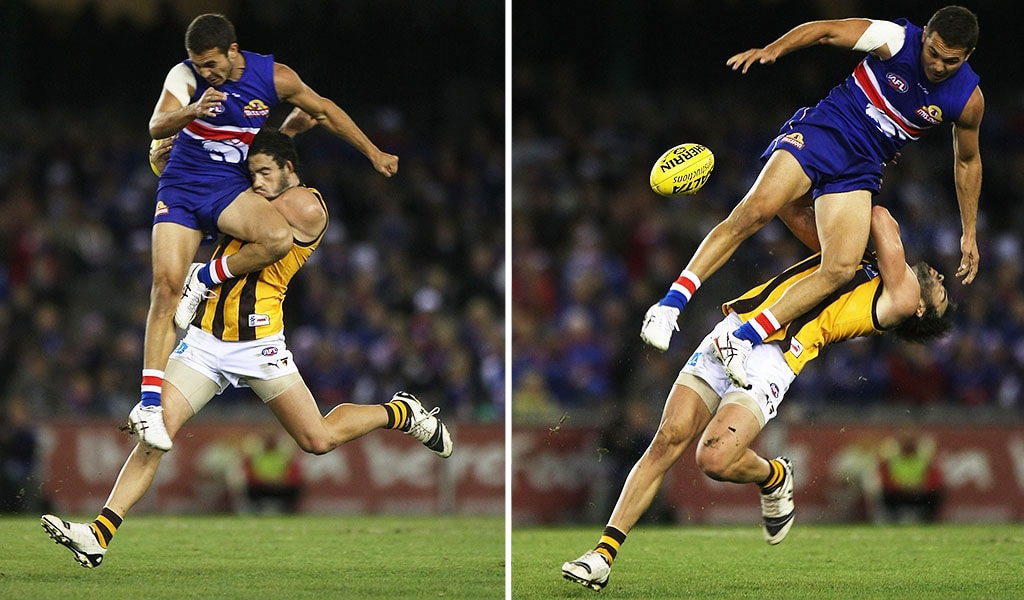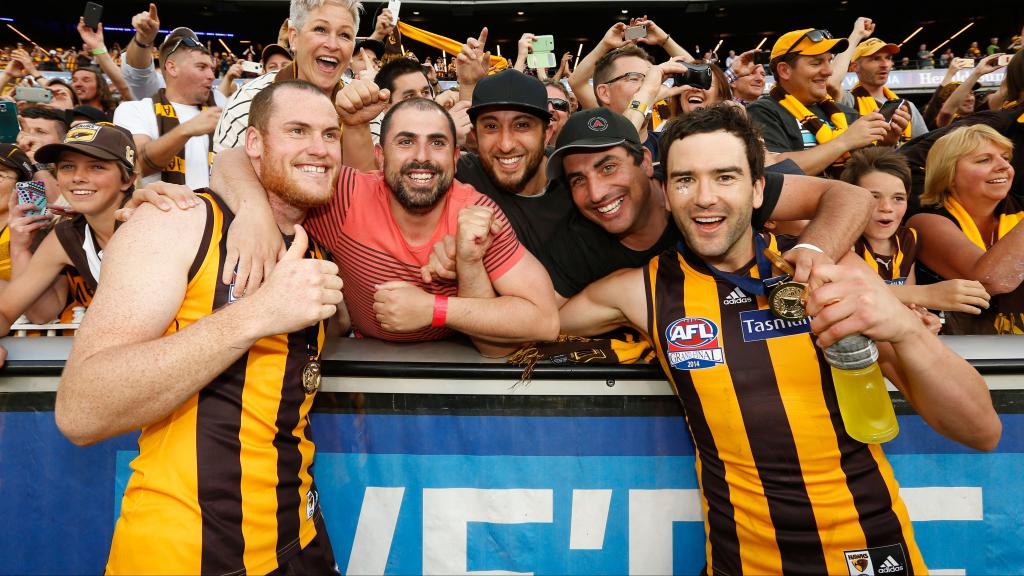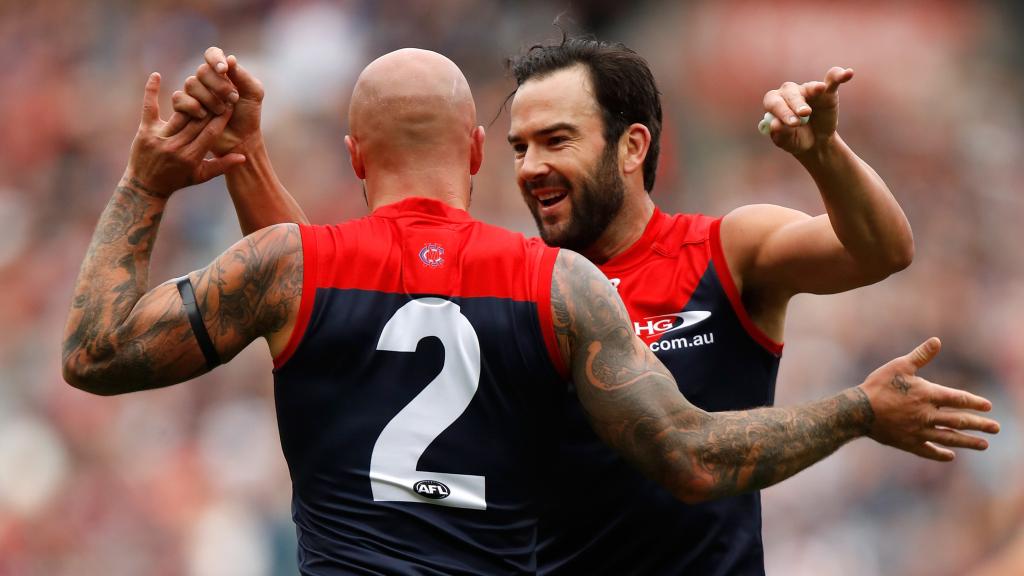JORDAN Lewis has always been a ruthless competitor.
At a time when the 'unsociable' Hawks ruled the roost in the AFL, Lewis was never far from the action or the fallout that ensued.
On at least a few occasions, in his ever-expanding media portfolio and weekly gig on Fox Footy's AFL 360, Lewis has been forced to explain and defend his actions.
There was the occasion in 2015, during his time as Hawthorn's 'unofficial' chief enforcer, he received a two-match suspension for a roundhouse hit on North Melbourne ruckman Todd Goldstein.
Then as a more mature head at his second club Melbourne, following his much-talked about trade at the end of 2016, he was rubbed out last season for three matches for a high strike that broke Carlton midfielder Patrick Cripps' jaw.
Lewis has been suspended for 12 matches and copped $10,500 in fines during his career.
However, as primarily a ball player, Lewis' attack on the footy has been just as fierce across the journey.
Lewis has come off second-best on a few occasions, most notably when he was concussed after forcefully colliding with Western Bulldogs opponent Jarrod Harbrow in the middle of Etihad Stadium in 2010.
Jarrod Harbrow collides with Lewis in round three, 2010. Watch the incident in the above video
"I remember speaking to 'Taz' (a nickname given to Lewis because his teammates thought he looked like former Magpie Chris Tarrant) six months after that and he said that he felt rattled for the following three weeks, but didn't tell anyone. They're the blokes you love playing with," former teammate Luke Hodge said.
Lewis has always played with a ruthless streak.
"That's probably what's kept me in the game, that competitiveness, and I think when you play so close to the line, it's inevitable you might step over it sometimes," Lewis said.
"Certainly some of my decisions on the field, when you do have time to look back on it is, 'what was I thinking?'"
There's a softer side to Lewis that doesn't necessarily fit the public persona.
Jarryd Roughead remembers his best mate asking Hawthorn for time off from training to accompany him to his chemotherapy treatments after he was diagnosed with a melanoma on his lungs in 2016.
"I've known him since I was 15, so he's the first person I ring when I don't really know what to do … when I'm just after some support and some care, and he definitely gave me that during the tough times," Roughead said.
Jarryd Roughead and Jordan Lewis have been tight for years. Picture: AFL Photos
Roughead and Lewis first met at a representative basketball tournament in 2001 in Ballarat and have been best mates ever since.
They were best man at each other's wedding and their kids often have play dates together.
Roughead says Lewis' wife Lucy and the arrival of his three boys – Freddie, 2, and twin boys Ollie and Hughie, nine months – have had a calming influence on him.
When Hawthorn selected Roughead (pick No. 2) and Lance Franklin (No. 5) in the 2004 NAB AFL Draft, it knew it needed a tough and uncompromising midfielder to complement the key talls.
Lewis, from Warrnambool in south-west Victoria, fitted the bill perfectly, according to coach Alastair Clarkson.
"If anything, we always knew he had great spirit and competitiveness, but it's his professionalism that has allowed him to play for so long," Clarkson said.
Lewis' ability to step up in big moments and play multiple roles for his side was vitally important during Hawthorn's four premiership victories.
"He was able to do things in big games because he was smart enough to put himself in those positions," Hodge said.
"Some guys go outside team rules to try to be heroes – Taz was never like that."
Clarkson says Lewis' key legacy is how he has adapted to the demands of the game and the rule changes throughout his 299-game career.
The discipline he showed to strip weight off his frame so he had the running capacity to play as a midfielder and the way he changed his game when the AFL introduced a rule that penalised players for sliding into the feet or knees of their opponents are prime examples, according to Clarkson.
He wants to win. He wants to be in successful environments. He drives that from a leadership perspective and in how he plays - Simon Goodwin
As one of the chief exponents of using the third-man up at ruck contests to advantage, Lewis was also forced to change that aspect of his game when the AFL eliminated the tactic by introducing the ruck nomination rule.
"He embraced a lot of different roles in the pursuit of team success and made many sacrifices for our side," Clarkson said.
Despite his advantage of being as malleable as any Hawthorn player during the golden period, Lewis' record speaks for itself.
A best and fairest winner and All-Australian in 2014, Lewis averaged 23.8 disposals in 264 matches for the Hawks from 2005 to 2016.
The 32-year-old will also join Australian Football Hall of Fame Legends Dick Reynolds, Leigh Matthews and Kevin Bartlett as the only players to reach 300 games, win four premierships and win a best and fairest in a premiership year.
That's elite company.
Lewis was said to be in line to inherit the captaincy for the 2017 season after Hodge stepped down but – in a move that shocked the football world – he was sensationally traded to Melbourne at the end of 2016 for a swap of late draft picks.
It followed then teammate Sam Mitchell's departure to West Coast in similar fashion as Hawthorn positioned itself to regenerate its ageing list.
Clarkson took solace from the fact both Lewis and Mitchell – and Hodge (after he decided to come out of retirement to join Brisbane this season) – were able to find stability and financial security in their lives.
"It's very, very hard to see these decorated players running around in different colours and being involved with different clubs," Clarkson said.
"It was a difficult decision to make (to move Lewis and Mitchell on), but at the end of the day we wanted what was best for the club and those guys as well."
Rather than sulk about the decision, Lewis embraced the opportunity to drive standards and act as a quality teacher for the Demons' young players.
In his first season at Melbourne in 2017, he finished equal-third in the best and fairest alongside co-captain Nathan Jones.
Lewis helped Nathan Jones with Melbourne's younger players last season. Picture: AFL Photos
Roughead called the move a "win-win" for both clubs, and it's difficult to argue.
Lewis, Melbourne's co-vice-captain alongside Max Gawn, agrees with his great mate. "If I had my time again, knowing what I know now, I'd make the same decision," Lewis said.
"To get exposure as a player at a different club has been brilliant for me and I've really enjoyed the opportunity of trying to fast-track the careers of these young kids."
One of those young kids, midfielder Angus Brayshaw, can see first-hand what Lewis brings to the table.
"I think the way we play and certainly when I look at my own vision there's little nuances that he picks up," Brayshaw said.
"He's such a critical thinker and I see his fingerprints all over what I do now and even how we play."
And his coach Simon Goodwin is an unabashed admirer.
"He's been outstanding since he's come here. He had an unbelievable history at Hawthorn but since he's come to us and once he's in your environment, you can see what a competitor he is," Goodwin said.
"He wants to win. He wants to be in successful environments. He drives that from a leadership perspective and in how he plays."
Lewis is contracted until the end of 2019, and has no plans to retire early.
"I'll be doing everything I possibly can next year and if my form warrants it – and I'm wanted by the club – then continue on past that," he said.
He is unsure whether he wants to remain in football, but his performances on AFL 360 and in pre-game roles with Fox Footy suggest he has a future in the media sphere.
Until then, Lewis is keen to prolong his time in the game and achieve the ultimate success with a talented group at Melbourne.
Clarkson, Hodge and Roughead all remarked about the speed in which Lewis – in his 14th season in 2018 – has reached the 300-game milestone.
"If you look at where he started – a Warrnambool boy who was a bit rough around the edges – to now be a father and a husband and have three great kids, playing at two great clubs and winning four flags. I don't think you could really argue that he's not had a great career," Roughead says.


